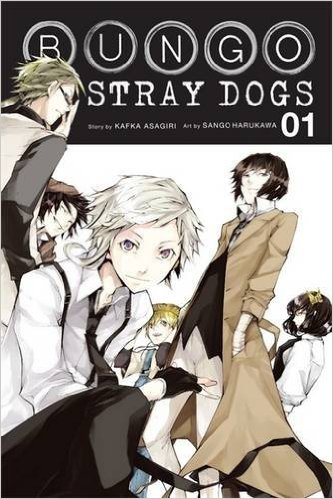By Kafka Asagiri and Sango Harukawa. Released in Japan by Kadokawa Shoten, serialization ongoing in the magazine Young Ace. Released in North America by Yen Press. Translated by Kevin Gifford.
I often regret that I haven’t read as much classical Japanese literature as I should. To be fair, a great deal of it is not translated into English, but there’s a ton that is as well, and for all that I’ve wanted to read No Longer Human, it sits on my phone with about 80 million other books I tried to read and then got distracted by. But I suppose I’m going in with the wrong mindset, as I don’t really want to read these works for their literary value, but in order to understand what the hell is going on in all the manga that make references to them. And honestly, do I know any other Dazai than No Longer Human? Did I even know the classic film Rashomon was based on a short story? And if I knew the literary references that flit throughout the first volume of Bungo Stray Dogs, would I find it more interesting than I did?
Without the literary references, what we have here is a somewhat standard superhero team-up story. Our young hero is an abandoned orphan fleeing a monstrous tiger creature that’s been following him around and wreaking havoc; he sees a very eccentric young man supposedly trying to kill himself in the nearby river and rescues him, and their two lives become intertwined. It turns out that a) the supposedly suicidal young man (like Zetsubou-sensei, it’s played for laughs throughout) is part of a group with powers who form a detective agency, and b) our hero IS the tiger that follows him around – that’s his power, though he’s been sort of suppressing it. After a brief test to see if he has the skill and compassion to make it in their agency, he joins up with them and they battle a mafia kingpin who uses his powers not for niceness, but for evil.
The literary references come in because they’re all named after famous Japanese authors and poets, and their powers are based on their most famous work. Dazai is the eccentric man, and his power is No Longer Human. The villain, Akutagawa, has a power called Rashomon, from the short story of the same name. And so forth. Without this, unfortunately, you’re mostly left with something that we’ve seen a lot of before, and I’m not sure the gimmick is enough to keep me interested. It doesn’t help that we get brother/sister incest used for humor value, something that can be done with a light touch, but rarely is a light touch used. There’s no doubt this is popular – it spawned an anime, and the cast are attractive bishies who snark at each other much of the time. The action scenes are also pretty well done. But I’m not sure that’s enough to make me come back. It’s good, but lacks that certain something.

